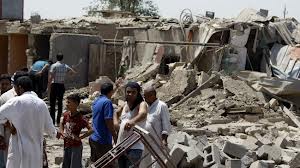 BAGHDAD (Dispatches) -- At least 107 people were killed in bomb and gun attacks in Iraq on Monday, a day after 20 died in explosions, in a coordinated surge of violence against mostly Shia Muslim targets.
BAGHDAD (Dispatches) -- At least 107 people were killed in bomb and gun attacks in Iraq on Monday, a day after 20 died in explosions, in a coordinated surge of violence against mostly Shia Muslim targets.
The bloodshed, which coincided with an intensifying of the conflict in neighboring Syria, pointed to possible clandestine hands to escalate the tensions in the region in order to achieve certain objectives.
The Iraqi government is increasingly coming inside the league of a "resistance" front which is led by Iran and Syria in opposing the occupying regime of Israel and its atrocities in the Middle East.
The American news agency Associated Press pounced on the occasion to declare that "Al-Qaeda is slowly resurging in the security vacuum created by a weak government in Baghdad and the departure of the U.S. military seven months ago".
"Though there was no immediate claim of responsibility, the leader of Al-Qaeda in Iraq declared on Sunday a new offensive aimed at sowing instability across the country," the news agency said.
The escalation in violence in Iraq coincides with a spate of attacks and bombings in several Syrian cities, led by Al-Qaeda and other extremist groups as well as shadowy armed gangs which are being supported by the U.S. and its Arab allies in the region.
The New York Times revealed recently that CIA was coordinating distribution of arms among the militants operating inside Syria in their bid to topple the government in the Arab country.
As well as the scores of deaths, at least 268 people were wounded by bombings and shootings in Baghdad, Taji to the north, the northern cities of Kirkuk and Mosul and many other places, hospital and police sources said, making it one of Iraq's bloodiest days in weeks.
No group has claimed responsibility for the wave of assaults but a senior Iraqi security official blamed the local wing of Al-Qaeda.
"Recent attacks are a clear message that Al-Qaeda in Iraq is determined to spark a bloody sectarian war," the official said, asking not to be named.
"With what's going on in Syria, these attacks should be taken seriously as a potential threat to our country. Al-Qaeda is trying to push Iraq to the verge of Shia-Sunni war," he said. "They want things to be as bad as in Syria."
The last two days of attacks shattered a two-week lull in violence in the run-up to the Muslim holy fasting month of Ramadan, which started in Iraq on Saturday.
The security forces themselves were often the targets or victims of the assaults perpetrated across Iraq.
Gunmen using assault rifles and hand grenades killed at least 16 soldiers in an attack on an army post near Dhuluiya, 70 km (45 miles) north of Baghdad, police and army sources said.
In Taji, 20 km (12 miles) north of Baghdad, six explosions, including a car bombing, occurred near a housing complex. A seventh blast there caused carnage among police who had arrived at the scene of the earlier ones. In all, 32 people were killed, including 14 police, with 48 wounded, 10 of them police.
Two car bombs struck near a government building in Sadr City, a vast, poor Shia swathe of Baghdad, and in the mainly Shia area of Hussainiya on the outskirts of the capital, killing a total of 21 people and wounding 73, police said.
Nine people, including six soldiers, were killed in attacks in the northern city of Mosul, police and army sources said.
In Kirkuk, five car bombs killed six people and wounded 17, while explosions and gun attacks on security checkpoints around the restive province of Diyala killed six people, including four soldiers and policemen, and wounded 30, police sources said.
Other deadly attacks occurred in the towns of Khan Bani Saad, Udhaim, Tuz Khurmato, Samarra and Dujail, all north of Baghdad, as well as in the southern city of Diwaniya.
The orchestrated spate of violence followed car bombs on Sunday in two towns south of Baghdad and in Najaf that killed 20 people and wounded 80.
Last month was one of the bloodiest since the U.S. withdrawal, with at least 237 people killed and 603 wounded.
Iraq, whose huge desert province of Anbar, borders Syria, is nervous about the impact of the conflict in its neighbor where mainly armed gangs are engaged in a wave of terrorist operations.
Hundreds of thousands of Iraqis took refuge in Syria from bloodshed that lasted for years after the 2003 U.S.-led invasion that toppled Saddam Hussein. Last week the Iraqi government urged them to return home to escape the violence in Syria.
At least 80 buses laden with returning Iraqi refugees crossed the border last week, a UN spokeswoman said.
A sectarian struggle for control in post-Assad Syria could raise tensions across the border and damage Iraq's chances of overcoming its own formidable security and political challenges.

















